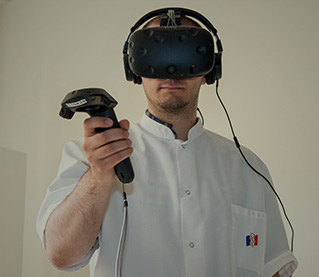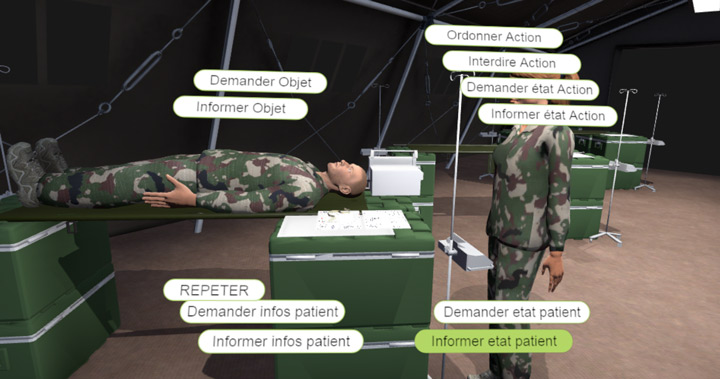Virtual reality to train medical experts in team management in crisis situations: the ANR VICTEAMS project

Knowing how to lead a team, communicate instructions effectively, coordinate actions etc. are essential non-technical skills in managing an emergency situation. To train more medical leaders more regularly in these skills, a virtual environment has been developed by the VICTEAMS project, which brings together academic research laboratories, operational services and a business.
 Using a virtual reality headset, the learner is immersed in a situation at an advanced medical post, where they must carry out several tasks and coordinate a team to manage a major influx and allocate and care for the injured under varying degrees of stress (fatigue, unforeseen events). This is where the tool innovates: the learner interacts with autonomous virtual agents, which have their own personalities and can make mistakes, and is led into relevant training situations through a dynamic scenario.
Using a virtual reality headset, the learner is immersed in a situation at an advanced medical post, where they must carry out several tasks and coordinate a team to manage a major influx and allocate and care for the injured under varying degrees of stress (fatigue, unforeseen events). This is where the tool innovates: the learner interacts with autonomous virtual agents, which have their own personalities and can make mistakes, and is led into relevant training situations through a dynamic scenario.
Developing the leader's abilities and raising their awareness of the team's non-verbal behaviour
Research in the humanities and social sciences was conducted in order to define the leader's actions, model emergency workers with representative behaviour and implement different levels of difficulty. The project's psychologists and ergonomists examined the concept of non-technical skills, which was considered too vague, and developed a corpus of 230 abilities that contribute to the definition of the leader's tasks, including 30 identified as non-technical (leadership, communication etc.), in order to train them in these skills.
How could the project realistically represent the emergency workers' non-verbal behaviours (postures, frowns etc.), which for the leader can be taken to mean proactiveness, passivity or even insubordination, and affect the leader's behaviour accordingly? Social psychology research was conducted among medical leaders using questionnaires and field observations (over 6,000 video annotations). These made it possible to identify the effects of subordinates' non-verbal behaviour (including facial expressions, looks, chest orientation and personal space) on leaders' perceptions and then to model them in the virtual environment to train the learner in several followership styles. Finally, stress intensity levels (intense noise, unfavourable climate etc.) were reproduced in the virtual environment following a survey of military care personnel to vary the difficulty of the challenge.
Confronting the experts with varied and mistaken collective behaviour
 To train the learner in adapting to the different collective behaviours observed on the ground, the members of the project implemented autonomous virtual characters, drawing on computational cognitive models. These virtual emergency workers have partial knowledge about the state of the world (victims, environment) and the team's activity and have their own personalities – they react differently to stress, for example. They decide which operation to perform (injecting morphine, dressing a wound etc.) based on the leader's orders, their own knowledge and their profile, and can thus make mistakes. A movement capture system is combined with physics-based animations to reproduce and animate their behaviour and interactions with objects realistically.
To train the learner in adapting to the different collective behaviours observed on the ground, the members of the project implemented autonomous virtual characters, drawing on computational cognitive models. These virtual emergency workers have partial knowledge about the state of the world (victims, environment) and the team's activity and have their own personalities – they react differently to stress, for example. They decide which operation to perform (injecting morphine, dressing a wound etc.) based on the leader's orders, their own knowledge and their profile, and can thus make mistakes. A movement capture system is combined with physics-based animations to reproduce and animate their behaviour and interactions with objects realistically.
When the simulation begins, the trainer selects the skills to be worked on and the difficulty level. A scenario-building system then plans adjustments at certain key points of the scenario, such as modifying a contextual aspect (missing equipment), adding an inconsistent event or changing the probability of whether an action will succeed. This adaptive scenario aims to orient the learner towards useful situations without reducing their freedom of action or the consistency of their staff's behaviour in order to train them in a specific skill or the ability to adapt to unforeseen circumstances.
The multidisciplinary project resulted in the development of a promising architecture for building virtual training environments for non-technical skills. The demonstrator has been tested with 45 medical leaders from the Paris fire brigade. These evaluations showed that the virtual characters' non-verbal behaviours had an influence on the leadership behaviour chosen by the leader. Evaluations were also conducted with ten military medical staff, both doctors and nurses, at the Ecole du Val-de-Grâce during April 2019. Further trials are planned for June 2019.
Future development is needed to improve the ergonomics of scenario planning, develop the virtual agents' ability to adapt to the learner as the learner improves and better model the effects of non-technical behaviour (stress management) on leaders' decision-making. The result will be an improved understanding of the human and emotional factors in systems for training medical teams to manage crisis situations.
Les partenaires du projet
Co-financé par l’Agence nationale de la recherche (ANR) et la Direction générale de l’armement (DGA), le projet VICTEAMS (2014-2019) regroupe 7 partenaires : Heudiasyc (UMR UTC CNRS 7253), le LIMSI – CNRS, l’Institut de Recherche Biomédicale des Armées (IRBA), le CEA – LIST, l’Ecole du Val de Grâce, la Brigade des sapeurs-pompiers de Paris, et Reviatech. Le projet a aussi reçu un soutien financier de la région Hauts-de-France et du Fonds européen de développement régional.


